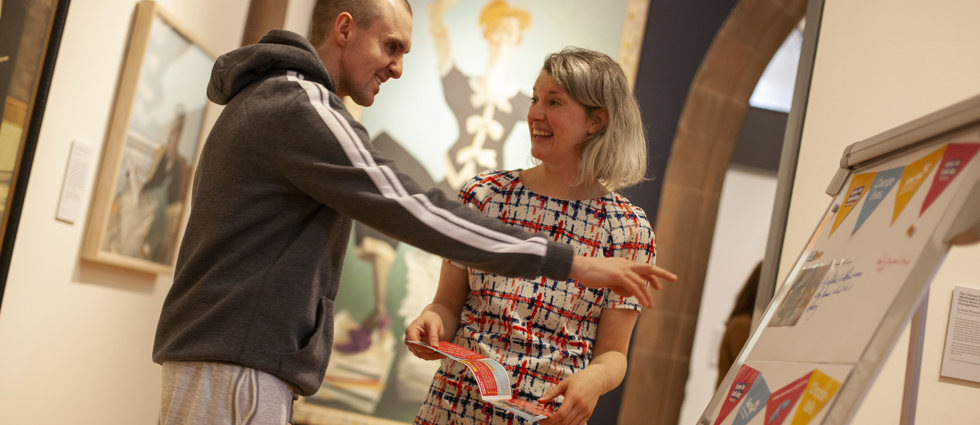
It's Okay to Talk
Find out more about delivering your own It’s Okay to Talk sessions.
It’s Okay to Talk is our resource for community groups and organisations to help people feel more confident talking about mental health
Below, we’ve got all the information you need to help you run an It’s Okay to Talk session in your community.
What is It’s Okay to Talk
This resource is made up of presentation slides, facilitation notes, conversation examples and a participant pack to help communities and groups deliver their own It’s Okay to Talk sessions. It includes exercises on how to effectively listen and respond to someone who might be struggling.
There's also guidance and advice for someone who wants to open up a conversation about their own mental health but doesn’t know where to start.
What does it involve?
The workshops are interactive, split into six key sections covering participants’ understanding of mental health stigma and discrimination, and group discussions tailored to building up confidence on how to start a conversation.
Each session is intended to run for about three hours. The first half highlights the impact and importance having conversations about mental health, while the second focuses on building up confidence in how to start a conversation. Participants will be asked what they consider a supportive conversation and then take part in scenarios where they can practice their listening and responding skills.
The person leading the session will be provided with facilitation notes, presentation slides, and supporting resources, including a pre and post evaluation to see what difference you’ve made.
These sessions will also cover how to ask for support and signposting for further help.
Download your pack!
Facilitation slides walkthrough
Learn how to deliver an It's Okay to Talk session by following along to our video narrated by See Me staff Claire and Maeve.
Learn how organisations have used the resources
It’s Okay to Talk has been developed over the last year, with input from See Me’s volunteers and seven different groups and organisations from across Scotland.
These include support charity Neil’s Hugs, Aberdeen University Mental Health Group, central-eastern European community support charity Feniks, arts organisation Fèisean nan Gàidheal, organisation Spit it Out, rugby club GHK Glasgow and See Me’s own volunteers.
Hear what they had to say about It’s Okay to Talk.
"It's Okay To Talk training provides essential information on how to talk about mental health. The workshop structure allowed participants to gain foundational knowledge and put it into practice in a safe environment. The group learned how to recognise different kinds of mental health stigma and, in the process, worked towards reducing self-stigma. After the session, most people felt more confident to ask about other people's well-being and also more comfortable talking about their own mental health. The training is a great resource that helps equip individuals with the necessary knowledge and skills. "
- Marlena Mkony, Polish social movement coordinator at Feniks.
"Any resource that reduces stigma and gives people the tools to have a conversation around mental health is invaluable. People often feel embarrassed to speak up for fear of judgement - but running sessions using this resource offer a safe, non-judgmental space, they can be honest about their fears on the subject. They will leave feeling that they are more able to talk about mental health, hopefully, feel able to ask for support if they need it and feel confident about approaching someone, they believe has mental ill health."
- Donna Paterson-Harvie, founder of Neil's Hugs Foundation.
"Being a male-dominated sports club, it was very evident that players and coaches were often reluctant to discuss their own mental health with each other never mind in a group situation. The sessions we had with See Me provided security and knowledge to the members of the club, allowing them to talk more freely about their health and also how to start conversations with others, not necessarily within the club, about concerns they might have about themselves or friends, family or work colleagues. Following the sessions, the players are more aware of each other's health and definitely more comfortable talking to each other about it, and also to identify any issues with others who may be reluctant to open up. The sessions we held could easily be modified to other groups requirements, but the framework is there for just about any sports club or team to use the resource and make it easier and more comfortable for discuss mental health."
- Gavin Hutton, vice president of GHK Rugby.
Any further questions?
If you have any further questions about It’s Okay to Talk and how to deliver a session, get in touch with Maeve Grindall on maeve.grindall@seemescotland.org or Claire Jennings on claire.jennings@seemescotland.org



